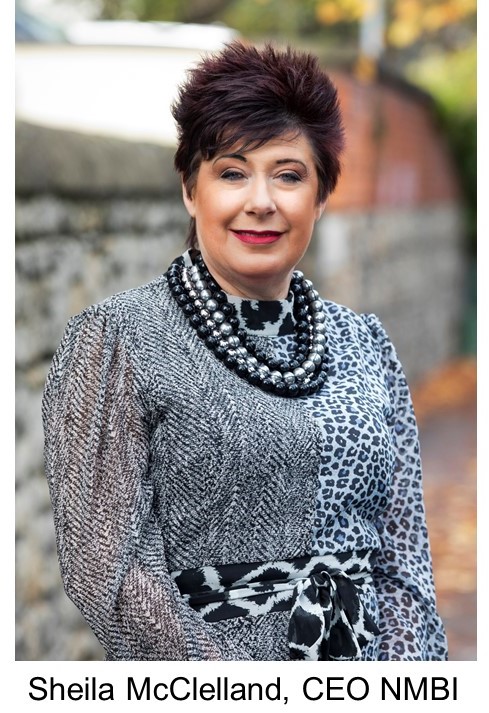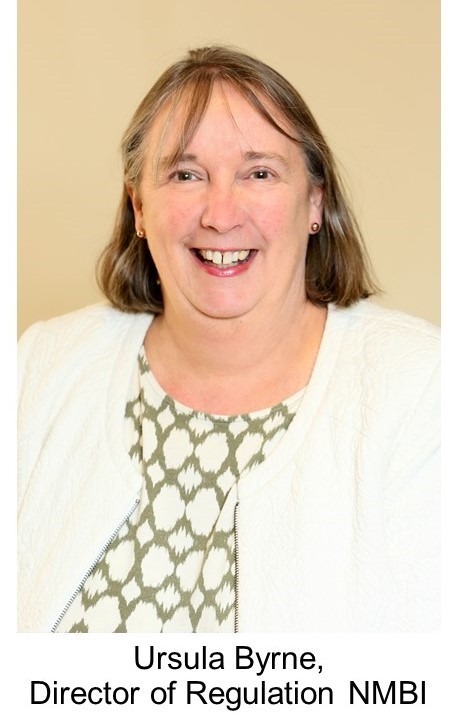 Legacy is an overused word, but when it comes to what Ursula has achieved in her time here, this is one of those occasions when I feel it is justified. She has done so many things at NMBI. She has held a number of senior roles but most significantly she held the midwifery brief and over the last 14 years has been our Director of Regulation. In this role she has shaped our complaints process and more recently assisted with its modernisation. Over her 20 years with the organisation her intellect, enthusiasm, dedication and commitment have made
Legacy is an overused word, but when it comes to what Ursula has achieved in her time here, this is one of those occasions when I feel it is justified. She has done so many things at NMBI. She has held a number of senior roles but most significantly she held the midwifery brief and over the last 14 years has been our Director of Regulation. In this role she has shaped our complaints process and more recently assisted with its modernisation. Over her 20 years with the organisation her intellect, enthusiasm, dedication and commitment have made
a positive impact on the way we do our job today. Ursula, our friend and colleague, ahead of your virtual celebration, I want to take this opportunity to thank you on behalf of all in the NMBI family and wish you the very, very best for the future.
Finally, those of you who know me will not be surprised to learn that I had one last ezine task for Ursula! Being newer to NMBI myself, I thought it would be good for us to hear a little of Ursula’s story before she leaves us. I think particularly for those studying or starting out in their careers it’s good sometimes to imagine, through other people’s experiences, the wonderful and different things that are possible if you are a nurse or midwife.

Sheila
How did this happen? Thoughts on 20 years in Regulation – My Story
 I never thought when I qualified as a nurse back in 1977 and as a midwife in 1978 that I would end up working in regulation. In fact, when I qualified, I knew very little about regulation. You had to pass the ‘State Exams’ and register with An Bord Altranais (ABA) and that was it. It was only when I travelled to Australia and then to Canada and had to register in those countries that I started to become aware of the regulation of nurses and midwives internationally. Through the years I moved into the area of midwifery education and became much more aware of the role of the regulator in relation to setting standards for education programmes, inspections and conducting exams. I was still unaware of the Fitness to Practise function within regulation, with no idea that in Ireland it dated back to the regulation of midwives in 1918. Complaints against midwives in those days were called ‘penal cases’ – a term that would give you the shivers in this day and age. In the archives¹ not all the cases are dated but the oldest one dates from 1924. Midwives could be suspended if they were a source of infection, a strange irony in the current climate.
I never thought when I qualified as a nurse back in 1977 and as a midwife in 1978 that I would end up working in regulation. In fact, when I qualified, I knew very little about regulation. You had to pass the ‘State Exams’ and register with An Bord Altranais (ABA) and that was it. It was only when I travelled to Australia and then to Canada and had to register in those countries that I started to become aware of the regulation of nurses and midwives internationally. Through the years I moved into the area of midwifery education and became much more aware of the role of the regulator in relation to setting standards for education programmes, inspections and conducting exams. I was still unaware of the Fitness to Practise function within regulation, with no idea that in Ireland it dated back to the regulation of midwives in 1918. Complaints against midwives in those days were called ‘penal cases’ – a term that would give you the shivers in this day and age. In the archives¹ not all the cases are dated but the oldest one dates from 1924. Midwives could be suspended if they were a source of infection, a strange irony in the current climate.
I moved into the area of regulation initially as a midwifery officer. It was an exciting time as ‘direct entry‘ midwifery was being re-introduced into the Irish system, having been stopped back in the late 1950s. The separate professional identity of midwifery as distinct from nursing was beginning to be rediscovered, culminating in the Nurses and Midwives Act 2011 formally recognising midwifery as a separate profession from nursing. ABA became the Nursing and Midwifery Board of Ireland (NMBI) – a happy day for me as my nursing colleagues would attest to!
Probably one of the most important milestones in the development of nursing and midwifery was the launch of the Scope of Nursing and Midwifery Practice Framework by ABA in 2000. This enabled the development and expansion of the professions and gave those working in regulation a ready response to the much-asked question ‘am I covered to do this?’ Nursing and midwifery education was moving into the third level sector and new career paths were opening up for nurses and midwives such as nurse and midwife prescribers and advanced nurse and advanced midwife practitioners, all supported by the regulator.
I moved to work in the area of Fitness to Practise (FTP) in 2006. At that time, it was still an area that not many registrants or the public knew much about. FTP inquiries were always in private and the outcomes of inquiries were not published. The only information available was statistics in the annual report. As FTP evolved, the emphasis on the primary role of the regulator in protection of the public came more to the fore, with it being explicitly stated in the 2011 Act. The importance of transparency in regulation increased. Outcomes of cases were published and then inquiries in public became the norm. Whilst this has been accompanied by an increase in complaints from the public, it must always be borne in mind that the number of complaints received are a very small percentage of the number of registrants, particularly when compared to other regulators nationally and internationally. FTP is a necessary part of regulation but can and should be carried out with public protection, fair procedures, and humanity at its core.
Regulation is continually evolving and NMBI is very much part of this process. IT has changed how we operate, and this will continue and develop. Regulators are part of a global community and NMBI is very much involved in this, collaborating with colleagues around the world. Regulators are constantly striving to improve the way in which they work to enhance public protection and support the development of the professions.
I’m still not sure how I got to be where I am now – mostly chance and opportunities that I took. All I know is that I have thoroughly enjoyed my career in regulation; have and continue to learn a lot; have worked with great people; have had the opportunity to collaborate with international colleagues and will watch with interest as NMBI and the global regulatory community continues its journey.
Sincerely,

Ursula Byrne
Director of Regulation
¹ The archives of the Central Midwives Board (1918 – 1950), the General Nursing Council (1919 – 1950), An Bord Altranais (1950 – up to 1985) and related other material (up to 1985) are housed in the U.C.D. Archives. This was as a result of a major project undertaken jointly and co-funded by ABA & UCD in 2007/2008.